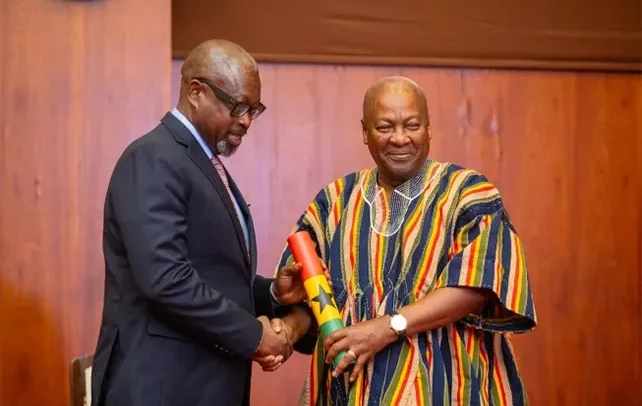COP (rtd) Nathan Kofi Boakye and President John Mahama
A gender activist has filed a suit at the Supreme Court seeking to remove Commissioner of Police (COP) (rtd.) Nathan Kofi Boakye from the newly constituted Police Council.
The suit, filed by Henrietta Nana Yaa Simpson, argues among other things that, the decision by President Mahama to ignore Assistant Commissioner of Police (ACP) (rtd.) Madam Florence Arthur – the person nominated by the National Association of Retired Police Officers to serve on the Police Council is unconstitutional, hence renders the decision to nominate COP (rtd.) Kofi Boakye null and void.
She is seeking a declaration that upon a true and proper interpretation of clauses (f) and (g) of Article 201 as amended by section 7 of The Constitution of Ghana (Amendment) Act, 1996, (Act 527) and the relevant sections of the Police Service Act, 1970 (Act 350), it is the members of the National Association of Retired Police Officers who, through their legitimately elected executive members, have the sole and exclusive right and authority to nominate a senior retired officer of their number onto the Police Council.
The writ also argues that the power of the President to make nominations to the Police Council is, subject to the necessary qualifications and consultations, restricted to Article 201 clauses (a), (g) and (h) and does not extend to clause (f).
It further argues that it is an undeniable fact that prior to the inauguration of the Police Council on June 10, 2025, the National Association of Retired Police Officers had, by an official communication dated January 20, 2025, presented Assistant Commissioner of Police (ACP) (rtd.) Madam Florence Arthur as its nominee.
Madam Simpson is seeking the apex court to make a consequential declaration that the appointment of COP Boakye (rtd.) on the Council as the nominee of the National Association of Retired Police Officers by the unilateral fiat of the President without any reference to the leadership of the Association, is unconstitutional and a gross encroachment on the exclusive constitutional right of the Association.
“A declaration that upon a true and proper interpretation of Articles 17, 201 (as amended by section 7 of The Constitution of Ghana (Amendment) Act, 1996, (Act 527)) and 296, the prescriptive removal of ACP (rtd.) Florence Arthur from the composition of the Police Council on the basis of her rank and gender is discriminatory and flies in the face of Article 17 of the Constitution.”
The writ wants a further order for the removal of COP (rtd.) Boakye from the Police Council and in his stead, the appointment or inclusion of ACP (rtd.) Florence Arthur onto the Police Council.
Statement of Case
The plaintiff argues in her statement of case that where the composition of the governing board or council of any public institution is by institutional representation, it is the respective institution’s and no other person or authority, including the President of the Republic, who have the power to nominate their own representative onto the relevant governing board or council.
It is the case of the plaintiff that in the instant case, it is not known by whose authority COP (rtd.) Kofi Boakye was nominated onto the Police Council as the representative of the Retired Senior Police Officers Association.
“The inclusion of the name of the 1st defendant (COP (rtd.) Kofi Boakye) onto the Police Council without the sanction by the leadership of the Association itself is a naked and indecent usurpation of the authority of the Association, unlawful and unconstitutional,” the plaintiff further argues.
The writ also avers that prior to the inauguration of the Police Council, ACP (rtd.) Ms. Florence Arthur had picked intelligence that some persons were scheming to exclude her from the membership of the yet-to-be-formed Council.
She, therefore, wrote to the President to essentially remind him of the constitutional imperatives in Article 201 and the practice of the Association over the years as to who represents them on the Council, but “this letter, though duly submitted, was not even dignified with an acknowledgment, much less, a response.”
BY Gibril Abdul Razak


